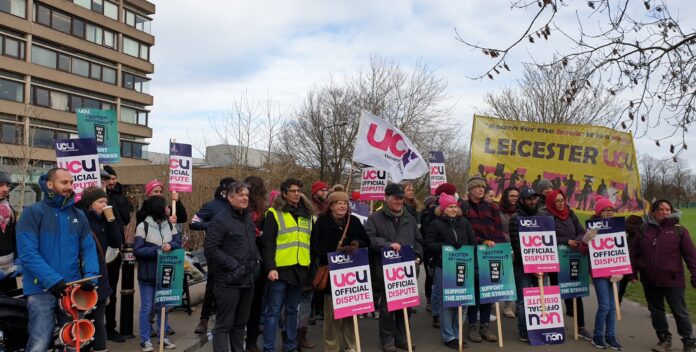Bea Gardner, UCU member
Over 70,000 university staff at 150 universities can now strike after University and College Union (UCU) members overwhelmingly voted ‘yes’ to strike action. Over 80% voted in favour, in two national ballots, beating the anti-union 50% turnout threshold.
We now need to build on this momentum with a strategy that backs up the ballot results, builds on the significant action already taken in recent years, and demonstrates we are prepared to take serious, escalating action in conjunction with other campus unions, Unison and Unite.
We must also appeal to students to stand with us as we take on our common enemies – the fat-cat vice-chancellors and the Tory government – fighting for free higher education, run in the interests of both staff and students.
It is the first time UCU has achieved a national mandate for strike action since the anti-union voting threshold was enacted in 2016. Every university member can now stand together to fight back against low and unequal pay, insecure work and high workloads, and every USS pension scheme member can strike together for a decent pension.
The results are a significant escalation in the disputes, which have been fought on a disaggregated basis so far.
The ballot campaign had many positive aspects, including the noticeable increase in resources allocated to support the ballot by the head office. But the main factor that secured a strong turnout and ‘yes’ vote is the conditions members face, combined with the confidence gained from seeing other workers taking action.
The political and economic situation further intensified members’ anger. Liz Truss was in post for less time than our ballot ran for, and the promise of fresh attacks by our new rich-list prime minister is a potential rallying point for struggle.
Determined to mobilise
With the ballot campaign and results fresh in members’ minds, these conditions will generate strong picket lines, including in the branches taking their first strike action since the 2011 pensions dispute.
Many activists in these branches are determined to mobilise for sustained action if required. Having been on the sidelines in recent years, they are now able to join the fightback.
Yet the general secretary’s proposed strategy, circulated as a discussion document, does not reflect these ripe conditions or the determined mood of most members.
Of course, the ballot results should be used as a tool in negotiations, but the strength of the mandate is lost if the employers don’t think we are serious about using it.
Similarly, the confidence members have right now is in danger of waning if action is stalled, or takes the form of token strike days with the promise of something more down the line. The overwhelming feeling is the result is an opportunity to show the collective power of university workers, and we want to use it!
A final decision on strategy and strike dates will be made at a Higher Education Committee meeting on 3 November.
Coordination
The union is fighting two separate disputes on a range of issues, and the experience of members coming into action is varied. Building links between branches and solidarity from the wider trade union movement, as well as maintaining the strike fund, will be important to keep the union united.
Serious coordination of strategy with the other campus trade unions is essential. Unite is currently balloting, and some Unison branches have live mandates, taking strike action already this term. As a minimum, the UCU should ensure our strategy aligns with the other campus unions.
Better still would be to join the striking UCU further education college branches, organising joint education demonstrations and mass pickets. We should plan with the National Education Union, which is currently balloting its members over pay, as a step toward a coordinated education strike in the spring.







